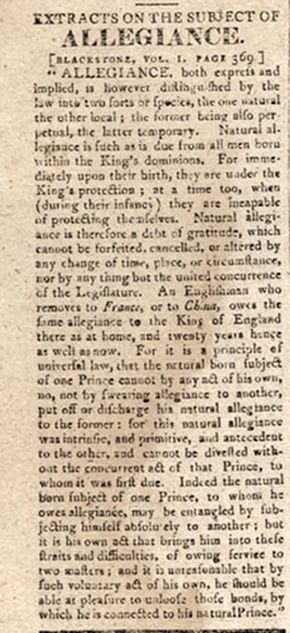
Extracts on the subject of allegiance [Blackstone, Vol. 1, Page 369]
“Allegiance, both express and implied, is however distinguished by the law in two forms or species, the one natural and the other local; the former also being perpetual, the latter temporary. Natural allegiance is such as is due from all men born within the King’s dominions. For immediately upon their birth, they are under the King’s protection; at a time too, when (during their infancy) they are incapable of protecting themselves. Natural allegiance is therefore a debt of gratitude, which cannot be forfeited, cancelled, or altered by any change of time, place, or circumstance, nor by any thing but the united concurrence of the Legislature. An Englishman who removes to France or to China, owes the same allegiance to the King of England there as at home, and twenty years hence as well as now. For it is a principle of universal law, that the natural born subject of one Prince cannot by any act of his own, no, not by swearing allegiance to another, put off or discharge his natural allegiance to the former: for this natural allegiance was intrinsic, and primitive, and antecedent to the other, and cannot be divested without the concurrent act of that Prince, to whom it was first due. Indeed the natural born subject of one Prince, to whom he owes allegiance, may be entangled by subjecting himself absolutely to another; but it is his own act that brings him into these straits and difficulties, of owing service to two masters; and it is unreasonable that by such voluntary act of his own, he should be able at pleasure to unloose those bonds, by which he is connected to his natural Prince.”
Acadian Recorder, 27 November 1813, Volume 1 Number 46. https://archives.novascotia.ca/newspapers/archives/?ID=799&Page=201113187
